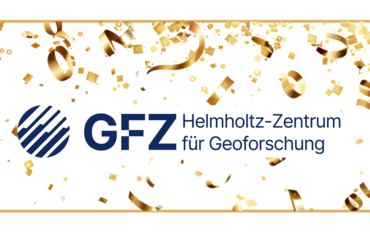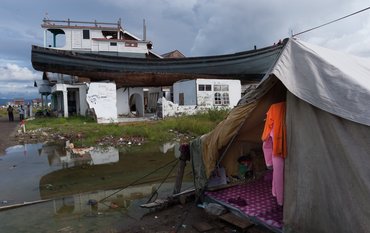25 + 2 years International Continental Drilling Programme ICDP
At the end of July, the GFZ hosted the IV. "International Conference of Continental Scientific Drilling: ICDP in the Second Quarter of its First Century" with 139 participants from 23 countries.
In 2021, the ICDP was unable to celebrate its 25th anniversary due to Corona. Highlights of the past years were presented and the future scientific and programmatic orientation of the international research drilling programme ICDP, which was co-initiated by the GFZ 27 years ago, was discussed.
Why Scientific Drilling?
Whether the origin of earthquakes and volcanic eruptions, the course of climate and environmental changes over many millennia, the formation and extraction of georesources for a sustainable energy supply (geothermal energy, raw materials), or the formation of the continents and life: "Without samples directly from the depths and measurements underground, central questions of geoscience cannot be solved. Research boreholes are our telescope into the earth." That is what Marco Bohnhoff, head of the "Geomechanics and Scientific Drilling" section at the GFZ and professor of experimental and borehole seismology at the Free University of Berlin, says.
Bohnhoff is also director of the International Continental Scientific Drilling Programme ICDP. This international geoscientific infrastructure enables land-based research drilling on various basic and application-oriented key questions.
Scientific drilling: Core competence of GFZ
In her welcoming address at the opening of this ICDP conference, the fourth to be held in Potsdam since 1993, Susanne Buiter, Scientific Director of GFZ, emphasised GFZ's leading role in scientific land drilling and also announced GFZ's future support of ICDP. She also acknowledged the common roots of GFZ and ICDP.
Magdalena Scheck-Wenderoth, Director of Department 4 "Geosystems", pointed out the role of scientific drilling in answering socially relevant questions. And she emphasised the importance of the ICDP for the GFZ Department she heads. The topic of research drilling is not only anchored in Section 4.2 "Geomechanics and Scientific Drilling", but is overall a key competence with far-reaching commitment of the other sections of the department as well.
The conference
Invited guests to the conference were project leaders of completed, ongoing and future ICDP research boreholes, members of ICDP committees, as well as about 30 specifically selected international young researchers.
The conference programme was divided into nine sessions with a mixture of contributions on the four core research themes of the ICDP (origin of continents and life, geohazards, georesources, climate change) with overviews of achievements and short presentations on new plans and projects, as well as five 'cross-topics' on the future direction of the ICDP programme, funding of major drilling projects, organisation of the OSG, major new research initiatives related to ICDP, outreach activities with a focus on involving young researchers.
The future of onshore scientific drilling
In the ICDP priority topic 'Georesources', high-temperature geothermal energy will play an important role in the future and a further focus will be on research into the genesis of rare earths and precious metals. In 'Geohazards', multi-component sensors are to be used at depth and long-term observations - for example of earthquake zones and volcanoes - are to be the focus. In 'Dynamics of the Continents', projects on the transition from the earth's crust to the earth's mantle and the early development of the earth and life are currently the focus. Finally, the theme 'Climate Change' focuses on East African environmental archives in the Great Lakes worldwide and the integrated analysis of existing data from diverse projects.
Background
ICDP: Review of the first 25+ years
Since its inception, the globally operating ICDP has been coordinated from Potsdam, Germany, and has funded 67 drilling projects that have drilled a combined total of over 100 km, uncovering unique samples and data to answer important questions about geohazards, climate and environmental change, georesources, and the origin of continents and life. The societal relevance of these questions is of great importance for the ICDP's funding of scientific drilling projects.
About the International Continental Drilling Programme ICDP
The ICDP is the international geoscientific infrastructure that enables land-based research drilling on various basic and application-oriented key questions. The drilling programme was founded in Potsdam in 1996 by Germany, the USA and China and has since been based at the GFZ German Research Centre for Geosciences.
22 countries, from the USA to Germany, China and Iceland, are members of the ICDP, as is UNESCO. Each country is represented by a scientific institution. Since the ICDP was founded in 1996, its development has been closely linked to the GFZ. The GFZ, together with the German Science Foundation DFG, promotes Germany's ICDP membership and finances the Operational Support Group, OSG, which operates from the "GFZ Centre for Scientific Drilling". The OSG consists of a team of scientists, engineers and technicians who support the project planning and management of ICDP projects. They take care of the management of the data collected during a drilling project, carry out borehole measurements, provide equipment for drill core examinations, advise on the implementation of drilling projects and carry out training measures.
New GFZ focus webpage for Scientific Drilling
Scientific drilling is one of the GFZ's focal topics in 2023.
We have compiled interesting facts about it on a new focus website:
www.gfz-potsdam.de/en/spotlights/scientific-drilling
Scientific contact:
Marco Bohnhoff
Thomas Wiersberg
Ulrich Harms












![[Translate to English:] [Translate to English:] Abror Gafurov von dem Schriftzug "Welcome to Azerbaijan" und den UN und COP Logos](/fileadmin/_processed_/2/5/csm_2024_11_Baku_COP29_Abror_Gafurov_1042faec82.jpeg)


![[Translate to English:] Martin Herold standing in front of the library on the Telegrafenberg](/fileadmin/_processed_/c/d/csm_Martin_Herold_d385ee4dd9.jpeg)
![[Translate to English:] Many people are listening to a presentation in the GFZ lecture hall.](/fileadmin/_processed_/c/a/csm_1_Bild1_hell_b9c0e9f5ed.jpeg)






![[Translate to English:] Both scientists sitting on stools in front of a wall of books in the Telegrafenberg library](/fileadmin/_processed_/6/6/csm_Buiter_Castell_DORA_4_e87cb1ea18.jpeg)
![[Translate to English:] Gruppenbild mit 4 Personen](/fileadmin/_processed_/8/d/csm_20241017_GFZ-Emmerman-Medal-005_web_reinhardtundsommer_21a414fa4a.jpeg)






![[Translate to English:] Ice landscape with five red tents](/fileadmin/_processed_/8/9/csm_Zeltlager_auf_dem_Eis_Urheberin_Jenine_McCutcheon_5ced2d523b.jpeg)
